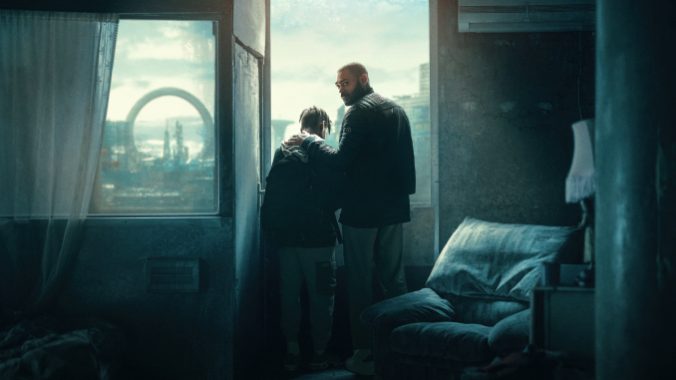Daniel Kaluuya and Kibwe Tavares’ Stylish Feature Debut, The Kitchen Is Lacking Sci-Fi

Daniel Kaluuya and Kibwe Tavares’ collaborative feature The Kitchen boasts style for days. Tavares channels his past experience as an architect into a striking dystopian housing project that hosts a societal thriller about universal class issues, taking a stand against blanket gentrification. It’s rooted in universal storytelling that’s shapeshifted into many forms: 2022’s Athena, 2011’s Attack the Block, and even 2005’s Land of the Dead. The problem? All of these sibling watches are markedly more interesting. Kaluuya and co-writer Joe Murtagh preach a message from the heart, but the inner workings of The Kitchen ring more hollow than the remarkable visuals suggest.
In futuristic London, all social housing has been eliminated. Izi (Kane Robinson) dreams of living in a deluxe luxury apartment, but resides in a community of folks who refuse to abandon their dingy complex known as “The Kitchen.” Through a series of events, Izi starts looking out for a now motherless Benji (Jedaiah Bannerman) despite plans to move elsewhere. Together, Izi and Benji navigate London’s unjust class system while trying to escape their poverty-stricken home. If they can survive police raids and gang mischief, maybe someday they’ll graduate to comfortable living conditions (a privilege in this look ahead at what our housing market could become without regulation or correction).
The parallels up and down The Kitchen are frequent and unfortunate. Athena uses biker gang youths as Robin Hood criminals and features these tremendous law enforcement battles on the people’s turf with infinitely more vigor. Land of the Dead builds an outer-ring marketplace out of chainlink fences and leftover supplies that feels more lived-in by its inhabitants. Attack the Block speaks volumes about growing up in a “Block” environment like poor Benji, further than Kaluuya and Tavares’ depiction. The Kitchen feels like it’s constructed from the building blocks of these titles and more—an introduction to humanitarian ideas that doesn’t fully engage with what lies beneath.
-

-

-

-

-

-

-

-

-

-

-

-

-

-

-

-

-

-

-

-

-

-

-

-

-

-

-

-

-

-

-

-

-

-

-

-

-

-

-

-








































